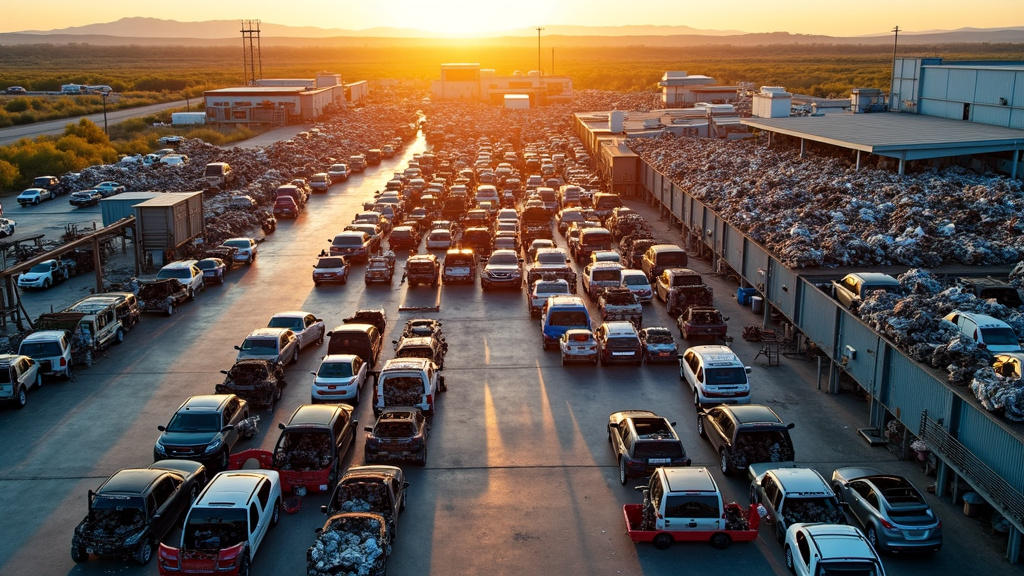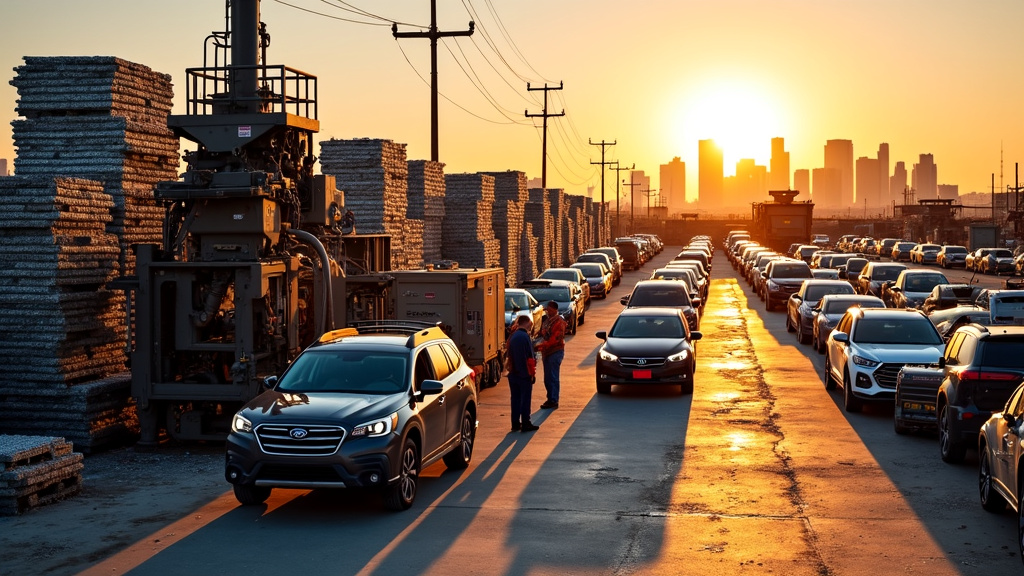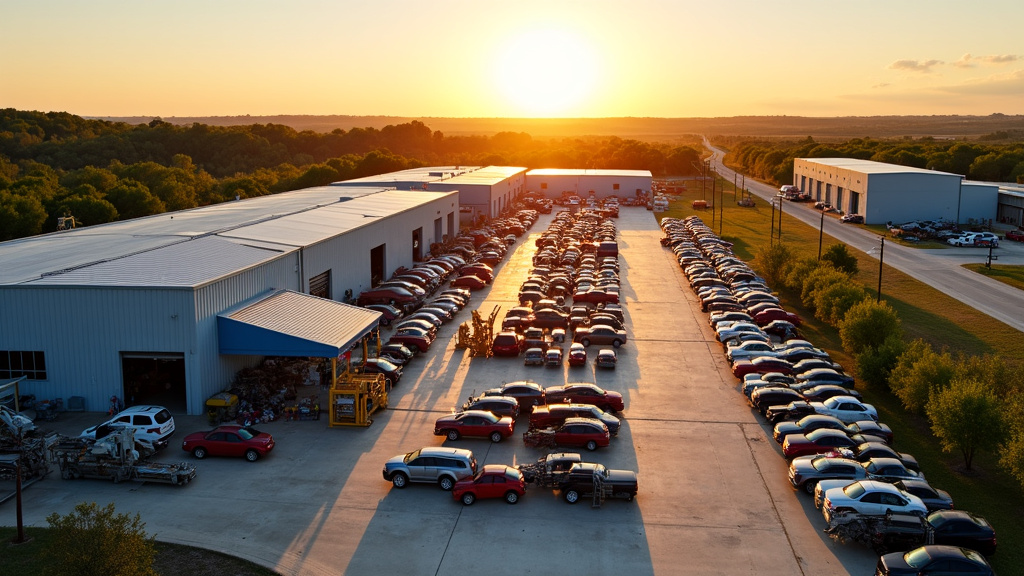5901 Botham Jean Blvd, Dallas, TX 75215
Wrecking Yards in Dallas: A Sustainable Solution
April 9, 2025Did you know that wrecking yards in Dallas process over 100,000 end-of-life vehicles each year, diverting millions of pounds of metal and other materials from landfills? These bustling hubs of automotive recycling play a crucial yet often overlooked role in our city’s environmental efforts.
As the automotive heartbeat of North Texas, Dallas wrecking yards serve as the final stop for vehicles that have reached the end of their road. However, far from being vehicular graveyards, these facilities breathe new life into old cars, transforming them into valuable resources that benefit both consumers and the environment.
For budget-conscious drivers and DIY mechanics, these yards offer a wealth of affordable auto parts. Need a gently used alternator or a hard-to-find bumper for your classic ride? A Dallas scrap yard likely has you covered, often at a fraction of the cost of new parts.
But the impact of these facilities extends far beyond cost savings. By carefully dismantling and recycling vehicles, wrecking yards in Dallas lead environmental conservation efforts in the sprawling Dallas-Fort Worth metroplex. They ensure that valuable metals, plastics, and other materials are reclaimed and repurposed, significantly reducing the automotive industry’s environmental footprint.
The Environmental Impact of Auto Recycling

Auto recycling is a key player in combating environmental degradation. It significantly reduces landfill waste and conserves valuable natural resources. In Dallas, wrecking yards are essential in reducing the automotive industry’s environmental impact, paving the way for a more sustainable future.
The impact of auto recycling on waste reduction is remarkable. According to Advanced Remarketing Services, materials recycled from cars save 85 million barrels of oil annually by avoiding the production of new parts. This highlights the immense potential for conserving resources through responsible auto recycling.
Metal recycling, a crucial aspect of auto recycling, provides substantial environmental benefits. Recycling steel saves 74% of the energy used to produce it from virgin ore. Aluminum recycling is even more efficient, offering energy savings of up to 95% compared to production from raw materials.
Reducing Landfill Waste
A major environmental benefit of auto recycling is the reduction of landfill waste. End-of-life vehicles (ELVs) contain materials that can pollute soil and water if improperly disposed of in landfills. By dismantling and recycling these vehicles, wrecking yards prevent harmful contaminants from entering the environment.
Auto recycling ensures that up to 80% of a vehicle can be recycled or reused, significantly cutting down the volume of waste that would otherwise end up in landfills. Tires, batteries, and fluids receive special attention in this process.
Additionally, recycling automotive glass, often overlooked, can greatly contribute to waste reduction. Windshields and windows, when properly recycled, can be turned into new glass products or used in fiberglass insulation production, further easing landfill strain.
Conserving Natural Resources
Auto recycling is crucial for conserving natural resources. By reusing materials from end-of-life vehicles, the demand for raw materials is considerably reduced. This conservation applies to various resources, including iron ore, bauxite (for aluminum), and petroleum-based products.
Recycling precious metals found in catalytic converters, such as platinum, palladium, and rhodium, is particularly impactful. These elements are costly and energy-intensive to mine, making their recycling essential for both economic and environmental reasons.
Moreover, recycling automotive plastics reduces dependency on fossil fuels. Many plastic components can be recycled into new automotive parts or used in other industries, creating a closed-loop system that minimizes waste and conserves resources.
Reducing Greenhouse Gas Emissions
Auto recycling also reduces greenhouse gas emissions. Producing new materials, especially metals, is energy-intensive and results in significant CO2 emissions. Recycling materials from end-of-life vehicles greatly reduces these emissions.
A study in the Journal of Cleaner Production found that recycling in electric vehicle production can lead to a 34% reduction in greenhouse gas emissions compared to production without recycling. This reduction is mainly due to the recycling of steel, aluminum, and battery components.
Proper disposal and recycling of automotive fluids prevent these substances from contaminating soil and water, protecting ecosystems and reducing the potential for harmful emissions into the atmosphere.
The Role of Dallas Wrecking Yards
In Dallas, wrecking yards are at the forefront of these environmental efforts. These facilities are vital for collecting, dismantling, and recycling end-of-life vehicles. By adhering to strict environmental standards and using advanced recycling technologies, Dallas wrecking yards ensure maximum material recovery and recycling.
The impact of these yards goes beyond recycling. They contribute to the local economy by creating jobs in the green sector and supplying affordable, recycled parts to consumers. This dual benefit of environmental protection and economic growth makes auto recycling a win-win solution for the city and its residents.
Additionally, Dallas wrecking yards often collaborate with local environmental agencies and engage in community outreach programs. These initiatives raise awareness about the importance of auto recycling and encourage responsible disposal practices among vehicle owners.
| Material Type | Energy Savings (%) |
| Steel | 75% |
| Plastics | 50% |
| Aluminum | 95% |
Benefits of Using Wrecking Yards for Auto Parts

When your vehicle needs repairs, costs can quickly add up. However, savvy car owners in Dallas are discovering a wallet-friendly secret: wrecking yards. These automotive resources offer a wealth of used auto parts that can significantly reduce repair expenses without compromising quality.
Wrecking yards, also known as salvage yards or junkyards, serve as a sustainable alternative to purchasing brand-new components. By providing access to pre-owned yet fully functional parts, these facilities play a crucial role in extending vehicle lifespans while decreasing the demand for new part production.
Explore the key advantages of sourcing auto parts from wrecking yards:
Substantial Cost Savings
The most immediate benefit of using wrecking yards is significant savings. According to the Environmental Protection Agency, recycled auto parts can be 20-80% cheaper than new ones. This price difference can make previously unaffordable repairs suddenly within reach.
For example, a transmission for a popular sedan model might cost $3,000 new, but you could find a perfectly functional used one for as little as $800 at a wrecking yard. These savings extend across various components, from engines and body panels to smaller parts like mirrors and door handles.
| Auto Part | New Price | Used Price | Potential Savings |
|---|---|---|---|
| Transmission | $3,000 | $800 | 73% |
| Engine | Varies | 50% less | 50% |
| Bumpers | Varies | 50% less | 50% |
The cost-effectiveness of used parts becomes even more apparent when dealing with older or discontinued vehicle models. In such cases, wrecking yards might be the only economical source for rare or hard-to-find components.
Environmental Benefits
Choosing recycled auto parts isn’t just good for your wallet; it’s also beneficial for the environment. By opting for used components, you participate in automotive recycling that helps reduce waste and conserve resources.
Manufacturing new auto parts requires significant energy and raw materials. In contrast, reusing existing parts minimizes the need for new production, thereby reducing associated carbon emissions and environmental impact.
Consider this: recycling a single ton of steel – a common material in many auto parts – can save 2,500 pounds of iron ore, 1,400 pounds of coal, and 120 pounds of limestone. By extension, choosing used parts contributes to these resource savings on a smaller scale.
Quality and Reliability
A common misconception about wrecking yard parts is that they’re of inferior quality. In reality, many salvaged components are in excellent condition, often coming from vehicles with low mileage or those involved in minor accidents that didn’t affect all parts.
Reputable wrecking yards in Dallas typically inspect and test parts before selling them, ensuring they meet performance standards. Some even offer warranties on their used parts, providing additional peace of mind to buyers.
Moreover, when you’re dealing with original equipment manufacturer (OEM) parts from a wrecking yard, you’re getting components specifically designed for your vehicle model, often at a fraction of the cost of new OEM parts.
Supporting the Local Economy
Choosing to buy from local Dallas wrecking yards does more than just save you money; it also supports the local economy. These businesses provide jobs and contribute to the city’s tax base, helping to keep economic benefits within the community.
Additionally, by reducing reliance on new parts (often manufactured overseas), wrecking yards play a role in strengthening domestic supply chains and promoting local economic resilience.
Navigating Dallas Wrecking Yards: Tips for Consumers

For Dallas residents looking to save on auto repairs, wrecking yards offer a wealth of affordable parts. However, these salvage havens can be overwhelming without proper preparation. Here are some essential tips to make your wrecking yard experience efficient and rewarding.
Know Your Vehicle Inside and Out
Before visiting a Dallas wrecking yard, gather detailed information about your vehicle. This knowledge is invaluable. Note your car’s make, model, year, engine size, and trim level. For complex parts, jot down relevant part numbers or specifications.
Seasoned salvage hunters often bring photos of the parts they need, which can be incredibly helpful when sifting through rows of vehicles. Don’t forget to document your car’s VIN (Vehicle Identification Number) – it’s a goldmine of information that ensures you find compatible parts.
Pro tip: Some savvy consumers bring their old part along for comparison, eliminating guesswork in the yard.
Understand Pricing Structures
Dallas wrecking yards typically use one of two pricing models: flat-rate or variable pricing. Flat-rate yards charge a set fee for each type of part, regardless of the vehicle it comes from. Variable pricing considers factors like the part’s condition, rarity, and demand.
Before making the trip, call ahead or check online to understand the yard’s pricing structure. Some yards post their prices online, allowing you to budget accordingly. Don’t hesitate to negotiate, especially for larger or more expensive parts.
Familiarize Yourself with Yard Policies
Each wrecking yard has its own rules and procedures. Some allow you to remove parts yourself, while others require staff assistance. Certain yards may have restrictions on the tools you can bring or specific safety requirements. Understanding these policies beforehand can save you time and frustration.
For example, some Dallas yards charge an entrance fee but offer a more hands-on experience. Others might be free to enter but require you to purchase any tools you need on-site. Always inquire about warranties or return policies – many yards offer limited guarantees on their parts.
Timing is Everything
Arriving early gives you first pick of newly arrived vehicles and ensures you have ample daylight to inspect parts thoroughly. Weekdays are typically less crowded than weekends, offering a more leisurely search experience.
Consider the weather when planning your visit. While a rainy day might deter other buyers, it can be an excellent opportunity to test for leaks or water damage in parts like sunroofs or window seals.
Bring the Right Tools and Supplies
A well-prepared salvage yard visitor is a successful one. Pack a basic tool kit including wrenches, screwdrivers, pliers, and a socket set. Don’t forget work gloves, as you’ll be handling potentially sharp or greasy parts. A flashlight can be invaluable for peering into dark engine bays or under dashboards.
Bring along some cleaning supplies like rags and a small bottle of degreaser. This allows you to clean parts for better inspection on the spot. A wheeled cart or dolly can be a lifesaver when transporting heavy parts back to your vehicle.
Your Wrecking Yard Checklist
- Vehicle details: Make, model, year, VIN, engine specifications
- Photos or diagrams of the parts you need
- Old part for comparison (if possible)
- Basic tool kit and work gloves
- Flashlight and cleaning supplies
- Wheeled cart or dolly for heavy parts
- Cash (some yards may not accept cards)
- Sturdy, closed-toe shoes and weather-appropriate clothing
- Notepad and pen for recording part locations or prices
Armed with these tips and your checklist, you’re now ready to tackle Dallas wrecking yards like a pro. Remember, patience and persistence are key – that perfect part at the perfect price might be just around the corner. Happy hunting!
How Okon Recycling Can Help with Wrecking Yards Dallas

Wrecking yards in Dallas face unique challenges in responsibly disposing of end-of-life vehicles. Enter Okon Recycling, a stalwart in the metal recycling industry with over a century of experience. This Dallas-based company has become an indispensable partner for local wrecking yards, offering innovative solutions that prioritize both efficiency and sustainability.
Okon’s approach to automotive recycling goes beyond simple scrap processing. They’ve developed a comprehensive system that maximizes resource recovery from end-of-life vehicles. This involves more than just salvaging obvious materials like steel and aluminum. Okon’s expertise extends to recovering precious metals from catalytic converters, recycling automotive fluids, and even finding new uses for materials that might otherwise end up in landfills.
The environmental impact of Okon’s services is significant. By partnering with wrecking yards, they’re reducing the automotive industry’s carbon footprint in Dallas. Their state-of-the-art facility, spanning 20 acres, uses cutting-edge technology to ensure every recyclable component is processed with minimal waste and energy consumption.
The Future of Auto Recycling in Dallas

The future of auto recycling in Dallas is promising, with innovative technologies enabling more comprehensive recycling processes. From advanced sorting techniques to recovering rare earth metals from electric vehicle batteries, the industry is pushing boundaries to maximize resource recovery and minimize waste.
As consumers, we play a vital role in this sustainable future. By considering the environmental impact of our vehicle choices and supporting local recycling efforts, we contribute to a cleaner, greener Dallas. Every car recycled helps conserve natural resources, reduce energy consumption, and decrease greenhouse gas emissions.
Okon Recycling, with its long-standing commitment to sustainability, exemplifies the forward-thinking partners driving change in the Dallas-Fort Worth area. Their state-of-the-art facilities and dedication to innovation ensure that auto recycling continues to evolve, meeting the challenges of tomorrow’s vehicles today.
To learn more about contributing to this sustainable future or recycling your vehicle responsibly, contact Okon Recycling at 214-717-4083.
